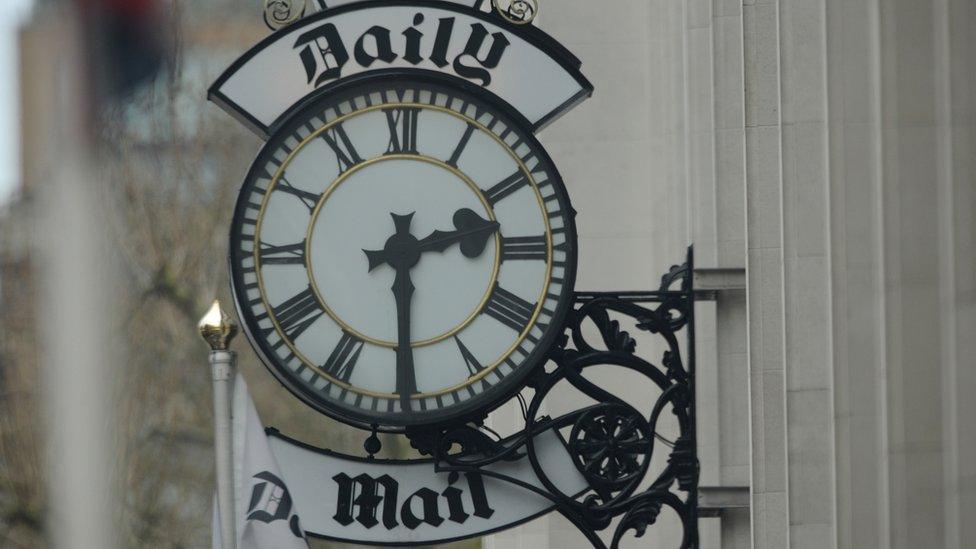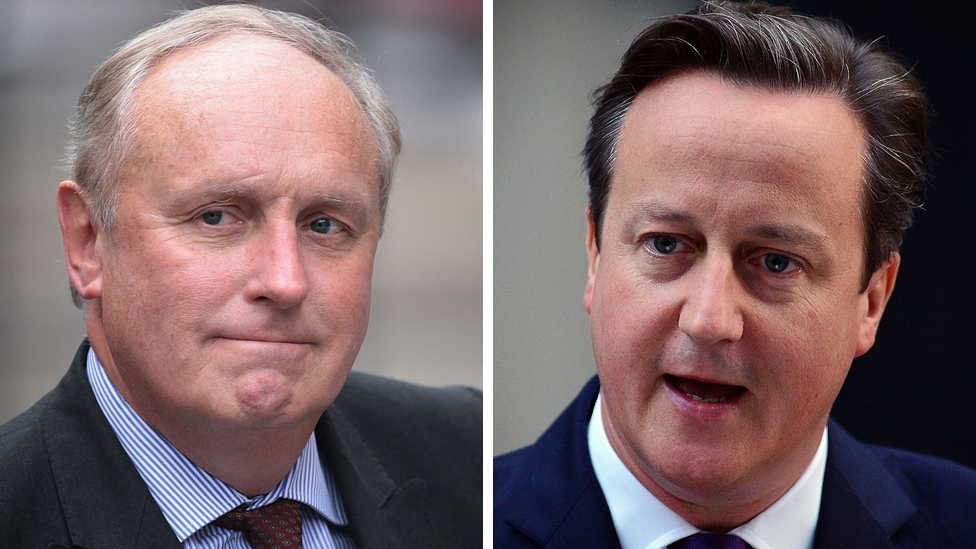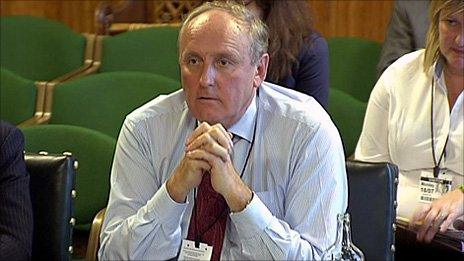Paul Dacre stepping down as Daily Mail editor
- Published

Daily Mail editor Paul Dacre is stepping down after more than a quarter of a century in the role.
He will become chairman of Associated Newspapers, which is owned by the company DMGT, and its editor-in-chief.
Associated also owns the Mail on Sunday, Metro and the Mail Online, the world's most popular English language newspaper website.
Mr Dacre, the Evening Standard editor before joining the Mail, starts his new job before turning 70 in November.
Lord Rothermere, chairman of DMGT, paid tribute to Mr Dacre for his "brilliant stewardship" of the Mail and other titles in the group over three decades.
"Paul is, quite simply, the greatest Fleet Street editor of his generation," he said.
Mr Dacre said the proprietor had given him "the freedom to edit without interference and the backing to assemble Fleet Street's greatest team of journalists".
His replacement is yet to be announced but contenders include Sun editor Tony Gallagher - tipped by Press Gazette editor Dominic Ponsford, external - and Geordie Greig, the Mail on Sunday editor.
Cameron 'tried to get Mail editor sacked'
Daily Mail editor 'never approved hacking'
Paul Dacre on Desert Island Discs in 2004
Under Mr Dacre's editorship the Daily Mail has taken a staunchly pro-Brexit line. Last November the paper controversially attacked three senior judges after they ruled that Brexit could not be triggered without a Westminster vote in a front-page story headlined "Enemies of the people".
Last year the BBC reported that then Prime Minister David Cameron tried to persuade Mr Dacre to "cut him some slack" ahead of the EU referendum vote.
After failing to do so Mr Cameron then asked Lord Rothermere to sack the pro-Brexit editor, a source told Newsnight.
The Mail editor was said to be "incandescent" and his resolve to campaign for Brexit "stiffened".

Kevin Maguire, associate editor of the Daily Mirror, described Mr Dacre as the "Godfather of Fleet Street, external, an immensely powerful editor of the Daily Mail. Catastrophic Brexit was his lash hurrah".
Tim Shipman, political editor of the Sunday Times and a former Mail journalist, said: "There isn't a prime minister over the last 30 years who hasn't been looking over their shoulder wondering what Paul Dacre thought of them. A lot of them didn't like that very much and there are members of the public who don't like that situation either."

Analysis
By Amol Rajan, BBC News media editor
Sub-editors at the Mail might take against the cliché, but Paul Dacre was the last of his kind.
When he entered the profession in the early 1970s, British newspapers had a degree of influence that they do not have now.
To a greater extent than has generally been recognised, his experience of Washington and America in the 1970s was formative.
David English decided early on that Dacre would be his successor at the Mail, and had the charm to tempt him. Rupert Murdoch wanted him to be editor of The Times, but Dacre declined.
At the Mail, he both channelled and shaped the conservatism of middle class Britain beyond London.

Jane Martinson, a journalism professor at City, University of London and former Guardian media editor, said: "Paul Dacre has wielded a power over politics and society in a way that no other journalist is likely to match in the coming generation. He steps down as the printed press enjoys its last hurrah in influencing or reflecting (depending on your point of view) public opinion over the EU and Brexit."
Stig Abell, a former managing editor of the Sun, said there would never be another editor like Mr Dacre.
Allow X content?
This article contains content provided by X. We ask for your permission before anything is loaded, as they may be using cookies and other technologies. You may want to read X’s cookie policy, external and privacy policy, external before accepting. To view this content choose ‘accept and continue’.
While it has regularly attacked both Tory and Labour governments on various issues, the Daily Mail paper has run many campaigns on other issues.
One of the most prominent came in 1997 with a bid to bring the killers of black London teenager Stephen Lawrence to justice.
Despite a sharp fall in newspaper sales in recent years, the Mail still sells an average of 1.28 million copies a day as its mix of politics, campaigns and celebrity news continues to appeal to millions of readers.
The Sun remains the UK's highest-selling daily newspaper, however, shifting 1.49 million copies a day in April.
Mr Dacre has long been Britain's best-paid newspaper editor, earning almost £2.5m last year. That was more than 50% higher than the previous year due to a £856,000 payout under DMGT's long-term incentive plan, which is linked to its share price.
He started out editing the student newspaper while studying English at Leeds University and joined the Daily Express in Manchester after graduating.
During a stint as New York correspondent for the Express, Mr Dacre was poached by the Daily Mail and returned to London in 1983 as the paper's news editor.
After just over a year editing the London Evening Standard, which was then owned by DMGT, he succeeded Sir David English as editor of the Mail in 1992.
- Published1 February 2017

- Published18 July 2011
